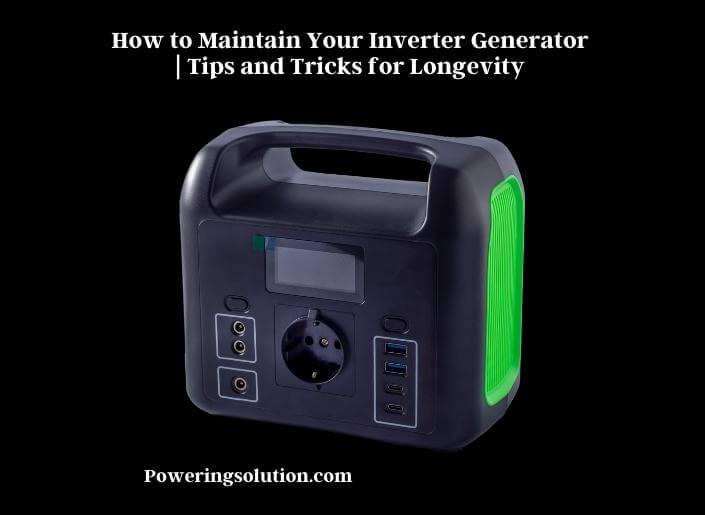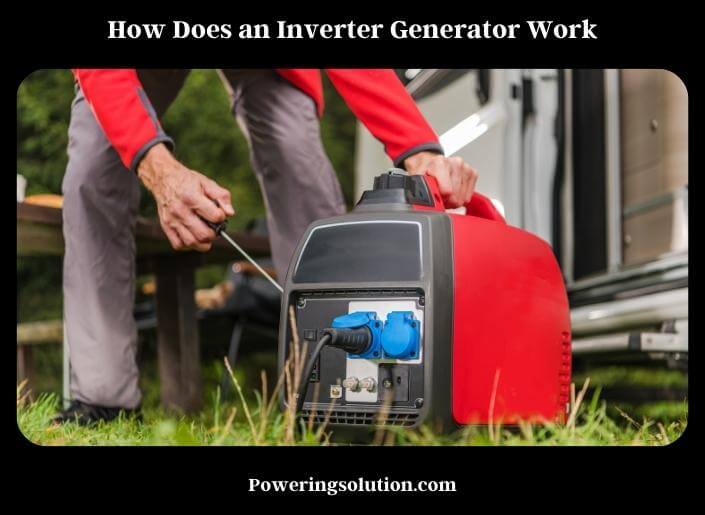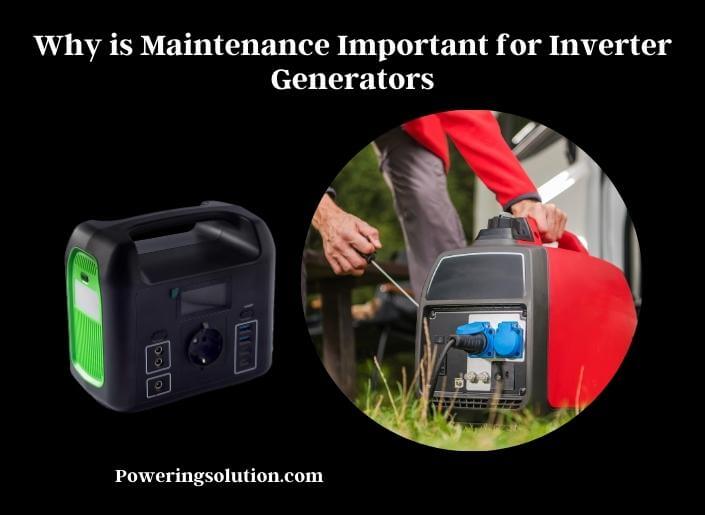Inverter generators have become increasingly popular over the years due to their portability, fuel efficiency, and quiet operation. They are commonly used for outdoor activities, RVs, camping, and emergency backup power. Like any other engine-powered device, inverter generators require regular maintenance to ensure their longevity and reliable performance.

Maintaining an inverter generator may seem daunting, but it is relatively easy and can save you money in the long run.
What is an Inverter Generator?
An inverter generator is a type of generator that produces AC (alternating current) power, which is then converted to DC (direct current) power and back to AC power with the help of an inverter module. This process produces a cleaner and more stable output of electricity compared to traditional generators, which makes it safer for sensitive electronic devices. Inverter generators are also more fuel-efficient and produce less noise than traditional generators, making them a popular choice for outdoor activities, RVs, camping, and emergency backup power.
How Does an Inverter Generator Work?
An inverter generator works by using a three-phase generator to produce high-frequency AC power, which is then converted to DC power by a rectifier. The DC power is then inverted back to AC power using an inverter module, which produces a clean and stable output of electricity that is safe for sensitive electronics.

The inverter module also allows the generator to vary the engine speed according to the power demand, which makes the generator more fuel-efficient and produces less noise. This is because the engine only runs at the required speed to produce the necessary amount of power, unlike traditional generators that run at a constant speed regardless of the power demand.
Inverter generators are also equipped with advanced features such as electronic fuel injection, automatic voltage regulation, and low-oil shutoff, which enhance their performance and safety.
Why is Maintenance Important for Inverter Generators?
Maintenance is essential for inverter generators to ensure their longevity, reliable performance, and safety.
Preventive maintenance helps identify and fix small issues before they become bigger problems. Regular maintenance can help detect potential issues such as worn-out parts, dirty air filters, and low oil levels, and address them before they cause significant damage to the generator.
Regular maintenance can extend the lifespan of the generator. A well-maintained inverter generator can last for several years or even decades, depending on usage and maintenance.
Proper maintenance can help ensure the generator operates efficiently. This means that it will use less fuel, produce less noise, and emit fewer pollutants.
Maintenance can help ensure the safety of the operator and the equipment. Inverter generators have several safety features such as low-oil shutoff, circuit breakers, and automatic voltage regulation. Regular maintenance can help ensure that these safety features are working correctly and can prevent accidents.

Regular maintenance can help ensure that your inverter generator operates efficiently, safely, and reliably. It can save you money in the long run by preventing costly repairs and extending the lifespan of the generator.
You have to know that NCM (Nickel Cobalt Manganese) batteries are a type of lithium-ion battery that is becoming increasingly popular in electric vehicles (EVs) due to their high energy density, longer lifespan, and faster charging time compared to other types of lithium-ion batteries.
Basic Maintenance Tips for Inverter Generators
Basic maintenance is essential for inverter generators to ensure their optimal performance and longevity.
- Check the oil level: Regularly check the oil level of your generator using the dipstick. If the oil level is low, add the recommended oil type and amount as per the manufacturer’s instructions. Change the oil after the recommended operating hours or period.
- Clean the air filter: The air filter prevents dirt, debris, and other particles from entering the engine. Clean or replace the air filter regularly as per the manufacturer’s instructions to ensure optimal performance.
- Check the spark plug: The spark plug ignites the fuel-air mixture in the engine. Over time, this can lead to damage or even failure of the battery. Remove and inspect the spark plug for any signs of wear, damage, or carbon buildup. Clean or replace the spark plug as per the manufacturer’s instructions.
- Inspect the fuel system: Check the fuel tank for any signs of damage, leaks, or contamination. Replace the fuel if it appears dirty or contaminated. Use fresh fuel and a fuel stabilizer if the generator will be stored for an extended period.
- Check the battery: If your inverter generator has a battery, check its condition regularly. Replace the battery if it appears damaged or not holding a charge.
- Store the generator properly: Store your generator in a clean and dry place away from direct sunlight and moisture. Drain the fuel tank and fuel system before storage, and follow the manufacturer’s instructions for long-term storage.
Advanced Maintenance Tips for Inverter Generators
In addition to the basic maintenance tips, some advanced maintenance tasks can help ensure the optimal performance and longevity of your inverter generator:
- Clean the fuel system: Over time, the fuel system can accumulate dirt, debris, and other contaminants that can affect the performance of the generator. It’s recommended to clean the fuel system at least once a year or after every 100 hours of operation. Use a fuel system cleaner and follow the manufacturer’s instructions.
- Inspect the cooling system: The cooling system prevents the engine from overheating. Check the cooling system for any signs of damage or leaks, and replace any damaged parts as per the manufacturer’s instructions.
- Check the valve clearance: The valve clearance is the distance between the valve and the rocker’s arm. Over time, the valve clearance can become too large or too small, affecting the performance of the engine. Check the valve clearance as per the manufacturer’s instructions, and adjust if necessary.
- Inspect the fuel injectors: Fuel injectors can become clogged or dirty over time, affecting the performance of the engine. Inspect the fuel injectors and clean or replace them as per the manufacturer’s instructions.
- Check the electrical system: The electrical system includes the battery, alternator, and wiring. Check the electrical system for any signs of damage or wear, and replace any damaged parts as per the manufacturer’s instructions.
- Inspect the exhaust system: The exhaust system removes harmful gases from the engine. Check the exhaust system for any signs of damage or leaks, and replace any damaged parts as per the manufacturer’s instructions.
Troubleshooting Common Problems with Inverter Generators
If your inverter generator is producing low power output, it could be due to several reasons such as a dirty air filter, clogged fuel filter, or low oil level. Check these components and clean or replace them as necessary. Check the load on the generator and make sure it’s not exceeding the maximum capacity.
If the engine won’t start, check the fuel level and make sure there is enough fuel in the tank. Also, check the spark plug and replace it if it’s dirty or worn out. Ensure that the fuel valve is open and the choke is in the correct position. If the problem persists, it may be due to a faulty starter motor or ignition switch, and professional help may be required.
Inverter generators can overheat if they are overloaded or if the cooling system is not working properly. Check the load on the generator and reduce it if necessary. Also, check the cooling system for any signs of damage or leaks, and replace any damaged parts as necessary.
Fuel leaks can occur due to damaged or loose fuel lines, a faulty fuel cap, or a damaged fuel tank. Check these components and replace any damaged parts as per the manufacturer’s instructions.
Inverter generators are designed to operate quietly, but excessive noise can be a sign of a problem. Check the engine oil level and make sure it’s not low. Also, check the air filter and clean or replace it as necessary. Excessive noise could also be due to loose components or damaged mufflers.
Additional Tips for Maintaining Your Inverter Generator
Air Filter
The air filter prevents dirt and debris from entering the engine, which can cause damage. It’s essential to check and clean the air filter regularly, especially if you’re using your generator in dusty or dirty environments.
Oil Filter
The oil filter helps remove contaminants from the engine oil, extending the life of your generator. It’s recommended to check and replace the oil filter regularly, as recommended by the manufacturer.
Cooling System
Inverter generators have a cooling system that keeps the engine from overheating. It’s essential to check the cooling system regularly and clean any debris from the air intake and cooling fins.
Fuel System
The fuel system includes the fuel tank, fuel filter, fuel lines, and carburetor. It’s essential to keep the fuel system clean and free of debris to ensure proper fuel delivery to the engine.
Safety Tips for Maintaining Your Inverter Generator
In addition to the maintenance tips mentioned earlier, it’s also essential to keep safety in mind when maintaining your inverter generator.
- Always turn off the generator and let it cool down before performing any maintenance tasks.
- Wear protective gear, such as gloves and eye protection, when working on your generator.
- Never operate your generator indoors, in enclosed spaces, or near open windows or doors. Generators emit carbon monoxide, which is a deadly gas.
- Keep the generator away from flammable materials, such as gasoline, oil, and propane.
- Do not touch hot parts of the generator or its engine, as they can cause burns.
- Always follow the manufacturer’s instructions for maintenance tasks, such as oil changes and spark plug replacements.
- If you’re not comfortable performing maintenance tasks on your generator, seek professional help.
Pros and Cons of Inverter Generator
| Pros | Cons |
| More fuel-efficient | Higher upfront cost |
| Quieter operation | Lower maximum power output |
| Better for sensitive electronic devices | Requires regular maintenance |
| Portable and lightweight | Limited run time at full power |
| Easier to parallel for more power | May not be suitable for heavy-duty use |
Last Remarks
Maintaining your inverter generator is crucial to ensure its longevity, reliability, and safe operation. By following the tips and tricks discussed in this article, you can keep your generator in top condition and avoid costly repairs or replacements.
Regular maintenance tasks, such as checking the oil level, air filter, and fuel system, should be performed as recommended by the manufacturer. Following safety guidelines and wearing protective gear when working on your generator is essential to prevent accidents and injuries.
Inverter generators offer many advantages over conventional generators, including their fuel efficiency, quiet operation, and suitability for sensitive electronic devices. However, they also require regular maintenance and have a higher upfront cost.
